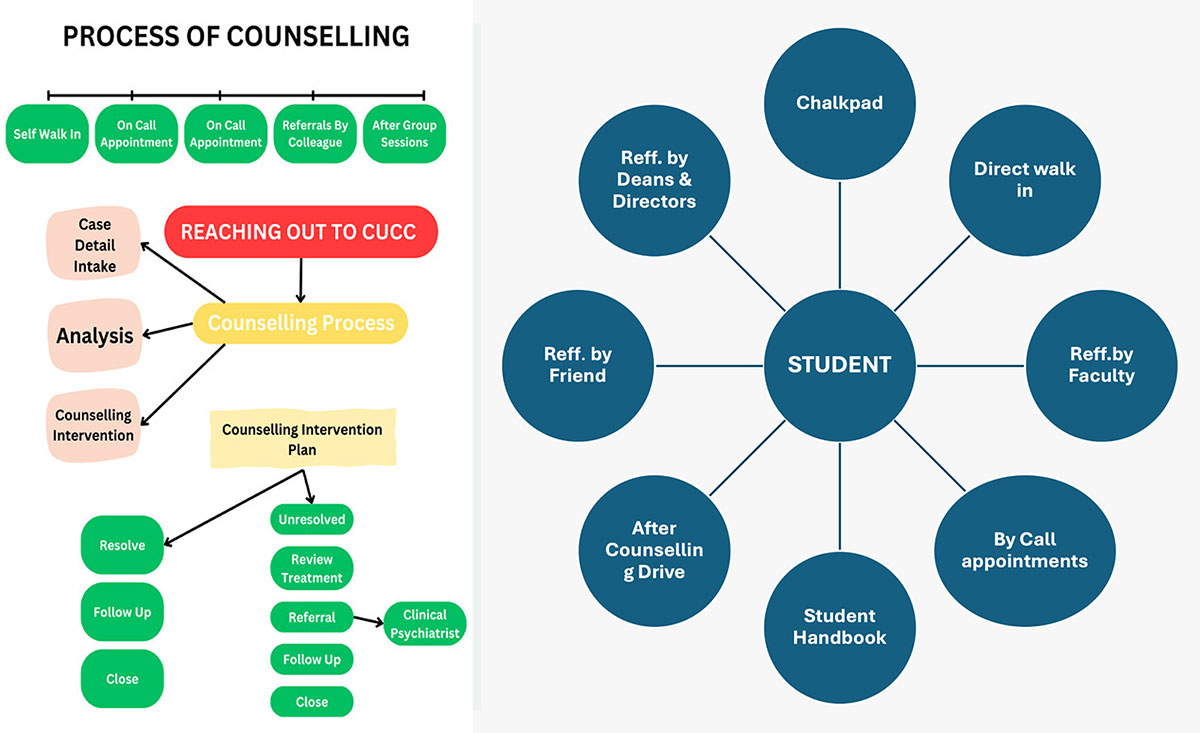This report provides an overview of the Counseling Services extended to students at Chitkara University. Our services emphasize both proactive and responsive approaches to foster comprehensive mental well-being. We address a wide range of concerns, including:
- Personal and relationship matters
- Emotional conflicts and anxiety management
- Social and adjustment challenges
- Issues involving family and friends
- Academic and career-related concerns
- Personality development
“At the Student Counselling Cell, we are dedicated to supporting our students by offering guidance and counselling to help them navigate life’s transitions, empowering them to view change as a powerful step toward a bright and promising future.”
The goal of Counseling is to support students in:
- Fostering positive and constructive behavior changes
- Enhancing their capacity to build and sustain social relationships
- Encouraging informed decision-making and self-awareness of their potential
- Effectively managing and coping with challenges
Individual Sessions
- Approximately 250 one-on-one sessions were conducted annually, each with a unique ID, addressing issues such as anxiety, depression, relationships, adjustment difficulties, and academic concerns.
- Around 20% of cases were classified as sensitive, requiring special attention and follow-ups, with dedicated FS file indexing for tracking.
- eneral cases are documented in departmental files (20 files labeled as FA).
- Evidence-based methods, including RE-CBT, MBT, and solution-focused therapy, were used to meet students’ mental health needs.
- Our approach is rooted in humanistic principles to foster empathetic and supportive interactions with students.
Group Sessions (See Glimpse #A – 19 Sessions)
- Conducted a variety of group sessions on themes like stress management, mindfulness, emotional regulation, self-awareness, resilience, and frustration tolerance, engaging a large number of students.
- Employed interactive, inclusive strategies to build a supportive community that encourages social connections and promotes mental well-being.
- Held classroom sessions for new students at the start of their first semester to introduce them to Chitkara University’s counseling services.
- Partnered with faculty and staff to create mental health resources and organize workshops for targeted groups of students and faculty.
- Hosted awareness events and campaigns aimed at reducing stigma around mental health and encouraging students to seek support.
- Ensured each student receives a digital counseling handbook to facilitate prompt access to counseling services in case of any need.
Proactive Initiatives (See Glimpse #B)
Responsive Services
- Provided crisis intervention and individual counseling for students experiencing distress.
- Arranged referrals and linked students to external resources for continued support in cases requiring specialized care, such as psychosis.
- Compiled daily and consolidated case data for tracking and evaluation.
- Coordinated with faculty, mentors, deans, and directors to address student concerns.
- Met with parents as needed to discuss and support sensitive cases.
Counseling Process
- Counseling begins with identifying the specific concern or issue a student is experiencing, forming the basis for the professional support offered.
- The counselor listens with empathy, fostering a safe environment where students feel comfortable sharing their thoughts and emotions openly.
- Through this process, the counselor assists the student in navigating a period of transition, guiding them in understanding and addressing their challenges.
- The primary goal is to enhance the student’s mental and emotional well-being, supporting their journey toward a more positive and fulfilling life.
- Students showed improvement in mental well-being, increased self-awareness, and strengthened coping skills, underscoring the value of a safe, non-judgmental environment for emotional support and expression.
- Our commitment remains focused on promoting mental wellness and empowering students to flourish.
- We are committed to /safeguarding the confidentiality of information shared during sessions.
- Adhering to ethical standards, confidentiality is maintained rigorously.
- In cases requiring further intervention from psychiatrists, we consult with higher authorities and relevant faculty to provide appropriate support.
- Otherwise, all counseling information and case records are kept strictly private and secure.
Outcome
Confidentiality
WAYS & MEANS TO REACH US FOR STUDENTS

WAYS & MEANS TO REACH US FOR STUDENTS

